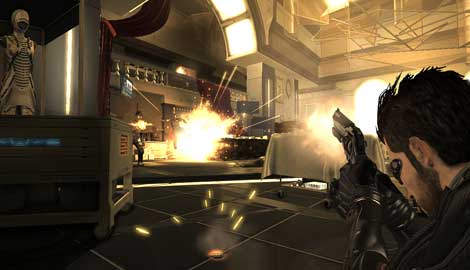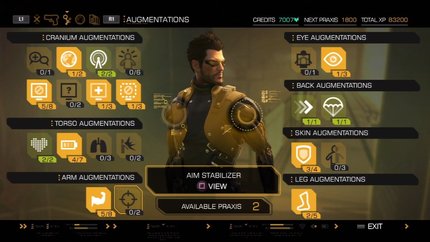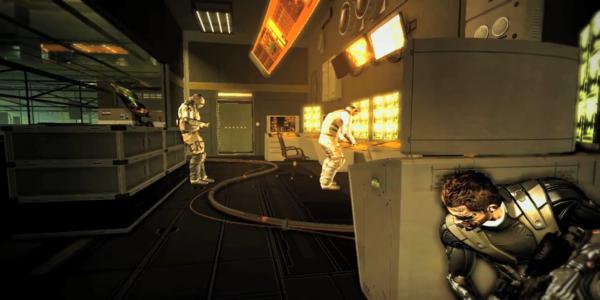Deus Ex Human Revolution PC Review
Deus Ex: Human Revolution is a game that has been hyped to be the true successor to the original Deus Ex, a game that is considered by many to be a classic in the RPG genre, being one of the first to offer a large amount of choice to the player. With such high expectations, there's plenty of weight on Human Revolution's shoulders. Luckily, however, it lives up to the expectations, as both a Deus Ex game, and as a modern release.
The story in Human Revolution follows Adam Jensen, a security officer turned augmented super soldier for Sarif Industries. After a brief prologue setting up the characters and showing the world, Sarif Industries HQ is attacked, and Jensen ends up on death's bed. Luckily for him, Sarif is one of the largest biotech corporations in the world, specializing in human cybernetic augmentation. So, he receives heavy augmentation to save his life, getting cybernetic arms, legs, eyes, and organs. With his new abilities, Jensen is tasked with finding out who committed the attack, and why. This leads him down a rabbit hole of corporations, conspiracies, and mercenaries. If you've played the original, you know who the major players in this universe are, so the larger revelations as to who the perpetrators are may be a bit muted as a result. As such, Human Revolution relies on the personal investigation of Jensen and Sarif Industries to keep the story engaging, and for the most part, it works. The beginning is a bit slow, with very small scale investigations, and few revelations of the main character. Once the story starts, however, you'll be thirsting for more information about the conspiracy, as well as the fate of Jensen.
The world that Deus Ex: Human Revolution creates deserves special mention. It's a world fueled by the trans-humanist debate that augmentations have brought. Pro-purity individuals are concerned that scientists are tampering with humanity itself, and the scientists think that it's the next evolutionary step. It doesn't help that most people reject their augmentations and therefore require a special, expensive drug that is sold by biotech corporations. It's an interesting dilemma, and it's one that is pondered by many characters you meet, with people on both sides of the arguments. It's because of the world that some of the weaker gameplay elements can be easily overlooked.
At it's core, Deus Ex: Human Revolution is a cover based stealth game/shooter. You're given a robust cover system akin to Rainbow Six Vegas, which allows you to duck out of, switch to and from, and move along edges in cover. Even with the great cover system though, the combat isn't especially enjoyable. The automatic weapons take too many shots to down enemies, and semi-automatic weapons take too long to reload (or draw a bead on an enemy) in order to be effective against the massive number of opponents. The AI in gunfights is quite bad, rushing forward in single file lines, and taking their time to fire (though once they fire, they are very accurate) Those, combined with Jensen's fragile health, makes Human Revolution a game best enjoyed in a stealthy manner.

While playing stealthily, Deus Ex is similar to 2010's Splinter Cell: Conviction. Most of the time, you'll be evading enemies, ducking from cover to cover in between their patrol routes, exploring the environment for the best route, hacking security to get past doors and turn off cameras, and, when push comes to shove, taking down the enemies with your hands or weapons, lethally or non-lethally. The stealth offers the most variety, allowing you to proceed through the environment multiple ways, and dealing with enemies per room in any manner you choose. You can hack turrets to kill enemies for you, you can stun all of your opponents with your stun gun, or go through without incapacitating anyone. The AI also operates far more effectively when searching for Jensen (at least on the PC), making the core stealth gameplay fun, tense, and rewarding. Since stealth proved far more enjoyable than combat, I spent the entire game playing stealthily, only engaging in combat when the game required it. This proved troublesome, however, any time it threw a boss fight at me.
Yes, you heard me correctly: there are boss fights. In a Deus Ex game. And unlike the original, there are no non-combat solutions to them, flying in the face of the core ideals of Deus Ex. It doesn't help that they aren't even good boss fights. They primarily use the most base of tactics, either running in your face, dealing damage and running away, or slowly moving and shooting with a powerful weapon. To top it all off, they are bullet sponges, taking dozens of assault rifle rounds to the head before going down. They also tend to screw over anyone who goes for a non-combat approach through the rest of the game, and gets caught in a boss fight without the proper combat augmentations. These boss fights do not fit in at all, but they are thankfully brief, so they don't detract from the game as much as you might think.
A lot of Deus Ex is comprised of no combat or stealth whatsoever, instead, just tasking the player with navigating the open world hubs, finding secret rooms, multiple paths, and hacking everything in sight for more information and items. These parts of the game are better than you'd think, since the world and atmosphere are so great. There's an OCD quality to how compelling exploring every inch of the map is. The fact that you gain extra XP for exploring new areas and finding new routes adds to this quality. You can also find side missions, which are some of the most unique moments in Deus Ex, with crime investigations, framing, and assassinations. All of the side missions are fun, and they can easily lengthen the game from 20 to 30 hours. The minigames that facilitate the specialized areas of gameplay also help making exploration a rewarding experience.
The multiple minigames that support the abilities and side missions are better than most RPG minigames in Deus Ex: Human Revolution. The hacking involves capturing multiple nodes, with a chance that the system will detect you each time you capture a node. It's basically a dice roll every time you capture a node, with lower odds of success for higher levels of security. The dialogue system is simpler than other Western RPGs such as Mass Effect, but it clearly tells you what each dialogue option does, and how you may manipulate others. 
The RPG backbone of Deus Ex 3 comes in the form of Praxis Points, points that you earn for your XP levels. Unlike the original Deus Ex, the skill point system in Human Revolution is very streamlined and restrained. You get one point per level, instead of thousands of skill points in odd numbers that you earned for objectives in the original. Now, to unlock a specific skill tree, it takes 2 Praxis Points, and to continue one, it takes one. This goes a long way towards making the skill tree and accessible and streamlined. The upgrades themselves come in three forms; upgrades that unlock new areas of the world, upgrades which make certain aspects of the game easier, and upgrades which increase Jensen's durability. Some of the upgrades are better than others, but almost all of them are useful in some way. There's upgrades which let you see through walls, turn invisible, incapacitate everyone in a 360 degree radius, and more. The upgrades serve as great carrots throughout the game, and I found myself looking forward to each Praxis point all the time.
The graphics, while less than incredible, are pretty good all around, running on Crystal Dynamics' engine. Technically, the facial animations are stiff, and there are some clipping issues. The technicals look clean for the most part, though, accurately showing what the art has to offer. And this is where the presentation shines: the art. The black and gold aesthetic really works and the atmosphere is thick and vibrant. All of the mechanical augmentations look really cool as well, making Jensen come off as someone who can definitely handle himself. The audio, for the most part, meets the visuals in quality and scope. The music is wonderful and atmospheric, with an electronic score by Michael Mccann underscoring every aspect of the game. The sound effects are great, as well. Where the audio falls flat is the voice acting. There are stereotypes, gravelly Christian Bale impersonators, and some oddly French-Canadian sounding characters (in an American setting). Overall, though, the presentation is great.

Above all, perhaps the most important part of Deus Ex: Human Revolution is that it feels like a Deus Ex game, and therefore, a PC title. The amount of options you have, all the information you can find in the environment, and the cyberpunk environment make it faithful to the original. That's not to say that there isn't any streamlining or accessibility for newcomers; quite the opposite, in fact. The tutorial in the beginning makes it very easy to play, and the controls are easy to understand, but none of this comes at the cost of depth. This makes Deus Ex: Human Revolution a great choice for both hardcore Deus Ex fans and newcomers.
Perhaps that's the greatest point I can make to people thinking about purchasing Deus Ex: Human Revolution. It doesn't matter if you're a Deus Ex veteran or newcomer to the franchise. As long as you want a game with atmosphere, a game with story, or a new RPG with plenty of options, then Deus Ex: Human Revolution will definitely satisfy you. Deus Ex: Human Revolution is a success in nearly every way, as a successor to the original Deus Ex, as a new RPG in a highly competitive market, and as a starting point for a whole new Deus Ex series, despite the few caveats that may come with it. This is one of the most unique, memorable games to come out this year so far, and if you like RPGs or Deus Ex, it's a must-buy.


